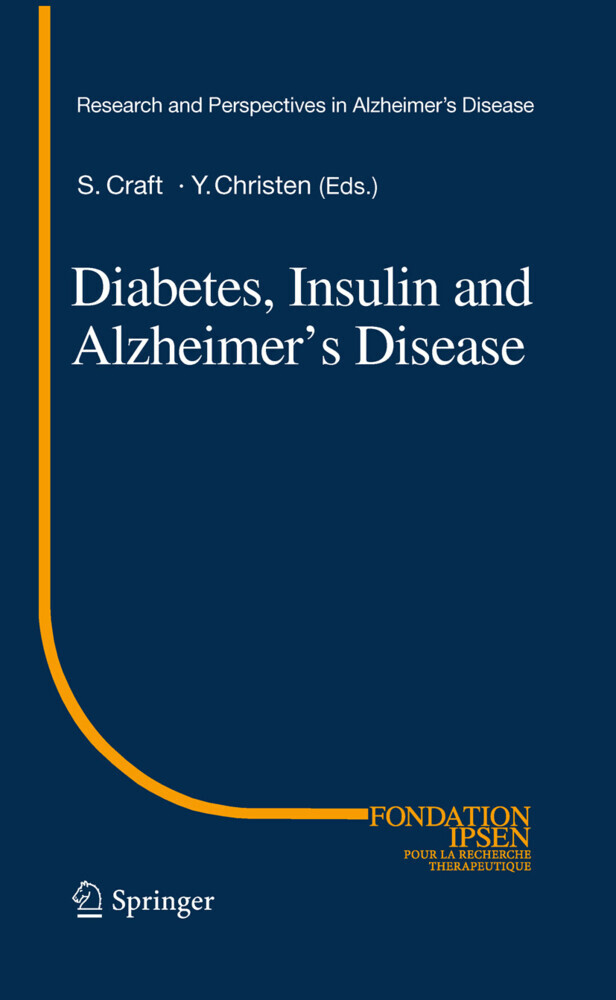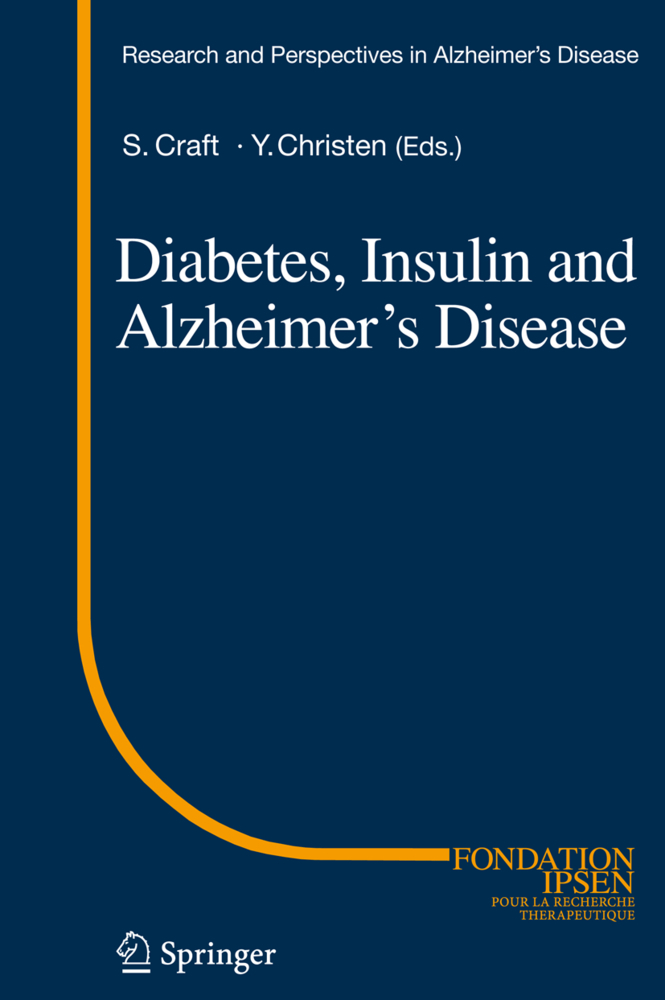This volume brings together experts from basic and clinical science to provide a broad survey of the role of insulin in the brain, and to discuss the mechanisms through which insulin dysregulation contributes to the development of cognitive impairment and late-life neurodegenerative disease. Each author has greatly furthered our understanding of the relationships among insulin, diabetes, and Alzheimer s disease, moving us far beyond the belief that the brain is an insulin-insensitive organ. Given the recent pandemic of conditions associated with insulin resistance, it is imperative that we achieve a comprehensive knowledge of the mechanisms through which insulin resistance affects brain function in order to develop therapeutic strategies to address these effects.
1;Forword;6 2;Acknowledgments;7 3;Contents;8 4;List of contributors;10 5;Insulin Action in the Brain and the Pathogenesis of Alzheimer's Disease;13 5.1;1 The Insulin Signaling System;13 5.2;2 Linking the Receptor to the Insulin and IGF-1 Signaling Pathways;16 5.3;3 Regulation of the IRS and IGF-1 Receptors in Physiology and Pathophysiology;17 5.4;4 Creation and Characterization of the Brain IR Knockout Mouse;18 5.5;5 Impairment of insulin Signaling in Brain is Linked to Neurodegenerative Disease;20 5.6;6 Insulin-degrading Enzyme in Pathogenesis of Alzheimer's Disease and Metabolic Diseases;22 5.7;7 Insulin, Diabetes, and Brain Cholesterol Metabolism;24 5.8;References;26 6;The Brain-insulin Connection, Metabolic Diseases and Related Pathologies;33 6.1;1 Introduction;34 6.2;2 Central Interplay of Insulin with Hormones, Neuropeptides and Neurotransmitters;35 6.3;3 Mechanisms of Action;36 6.4;4 Metabolic, Mood and Neurodegenerative Pathologies;38 6.5;+;43 6.6;5 Current treatment trends;44 6.7;6 Conclusion;45 6.8;References;46 7;Insulin-Mediated Neuroplasticity in the Central Nervous System;55 7.1;1 Introduction;56 7.2;2 Morphological Plasticity;56 7.3;3 Oxidative Stress;57 7.4;4 Hypothalamic-Pituitary-Adrenal Axis Dysfunction;58 7.5;5 Insulin and the Glutamate System;59 7.6;6 Leptin;60 7.7;7 Insulin;61 7.8;8 Conclusions;62 7.9;References;63 8;Stress Hormones and Neuroplasticity in the Diabetic Brain;69 8.1;1 Introduction;69 8.2;2 Deficits in Hippocampal Structure and Function in Rodent Models of Diabetes;70 8.3;3 Diabetes and the HPA Axis;72 8.4;4 Effect of Diabetes on Hippocampal Structure and Function: A Role for Glucocorticoids;73 8.5;5 Diabetes and Elevated Glucocorticoids in Human Cognition;74 8.6;6 Interventions that Attenuate Diabetes also Reverse Central Diabetic Encephalopathy;75 8.7;7 Brain-derived Neurotrophic Factor and Diabetes;76 8.8;8 Stress, Diabetes, and AD Pathology;77 8.9;9 Epidemiology of Diabetes, Stress, and AD in Humans;77 8.10;10 Summary and Conclusion;78 8.11;References;79 9;Diabetes and the Brain - An Epidemiologic Perspective;84 9.1;1 Brief Description of Evidence Linking Diabetes to Late-age Cognitive Disorders;84 9.2;2 Integrated Community-Based Studies of Diabetes and the Brain;85 9.3;3 Cognitive Function;86 9.4;4 Brain Structure;87 9.5;References;89 10;Cognition in Type 2 Diabetes: Brain Imaging Correlates and Vascular and Metabolic Risk Factors;92 10.1;1 Introduction;93 10.2;2 Defining Cognitive Dysfunction;93 10.3;3 Defining Diabetes;94 10.4;4 Cognition and Dementia in DM2 and Pre-diabetic Stages;94 10.5;5 Brain Imaging in DM2;96 10.6;6 Risk Factors for Impaired Cognition and Brain Imaging Abnormalities in DM2;96 10.7;7 Conclusion;97 10.8;References;97 11;The Relationship Between the Continuum of Elevated Adiposity, Hyperinsulinemia, and Type 2 Diabetes and Late- onset Alzheimer's Disease: An Epidemiological Perspective;100 11.1;1 Introduction;100 11.2;2 The Continuum of Adiposity, Hyperinsulinemia, and Type 2 Diabetes;101 11.3;2.1 Potential Mechanisms Relating the Continuum of Elevated Adiposity, Hyperinsulinemia, and Type 2 Diabetes with LOAD;104 11.4;2.2 Cerebrovascular Mechanisms. Brain Infarcts;104 11.5;2.3 White Matter Disease;105 11.6;2.4 Hyperinsulinemia and Beta Amyloid Clearance;105 11.7;3 Summary of Prospective Epidemiological Studies Linking Adiposity, Hyperinsulinemia, and Diabetes to AD 3.1 Adiposity;106 11.8;3.2 Hyperinsulinemia;107 11.9;3.3 Type 2 Diabetes;108 11.10;3.4 Metabolic Syndrome;109 11.11;4 Implications for the Prevention and Treatment of AD;109 11.12;References;111 12;The Role of Insulin Dysregulation in Aging and Alzheimer's Disease;119 12.1;1 Insulin and the Brain;119 12.2;2 Insulin Resistance and AD;121 12.3;2.1 Insulin Abnormalities and AD Pathology;121 12.4;2.2 Insulin Resistance and Vascular Dysfunction;124 12.5;3 Therapeutic Implications of Insulin Resistance as a Pathogenetic Mechanism in AD 3.1 Pharmacologic Insulin Sensitization;125 12.6;4 Intranasal Insulin;127
Craft, Suzanne
| ISBN | 9783642043000 |
|---|---|
| Artikelnummer | 9783642043000 |
| Medientyp | E-Book - PDF |
| Auflage | 2. Aufl. |
| Copyrightjahr | 2010 |
| Verlag | Springer-Verlag |
| Umfang | 218 Seiten |
| Sprache | Englisch |
| Kopierschutz | Digitales Wasserzeichen |











